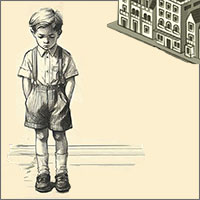
Camping for orphanages, early-mid 20th century UK

Extracted from the memoirs of Brenda May Wilson, 1927-2003
Holidays to look forward to
Camping once a year in the Summer was quite a norm for orphanages. Our orphanage went to Summer Camp for two weeks at a place called Dyffryn, in Wales, near Barmouth. All the orphanages from all over the county were there, all under canvas. This was something to look forward to, meeting up with other children and comparing notes.
I only attended two camps, in 1938 and 1939, as war broke out and the camps were stopped.
Order and discipline to run the camp
The camp was like a giant military camp with rows and rows of bell tents all in alphabetical order, and run - I imagine - with military precision. Order and discipline were kept here too, and it was fairly simple to identify which child was which as every orphanage had its own colour or uniform. Some children were in khaki shirts and shorts but there was every other colour imaginable.
Bell tents for our sleeping
There were five children to a tent, sleeping feet to the tent pole. The tents had wooden floors and we slept with grey blankets over and under us. These had to be properly folded next day over the pillows, and arranged around the pole (there was a morning inspection), and the lower walls of the tent rolled up and fastened.
Meals
Meals were eaten in a big marquee, and of course the no-talking rule was relaxed, so you can imagine the noise! There was quite a lot of horseplay, with the hated fat meat going under the table, 'accidentally' dropped.
Washing-up and cleaning of cooking utensils was again done by the children. Everyone got supper, queuing up in long lines with their mugs for cocoa, and bread and dripping.
At the beach
Each morning at eleven we had bathing parade. Team leaders were picked, each heading a team of ten. Whoever was chosen had to keep an eye on the other nine, which wasn't much fun but leaders were different each day. Heads were counted, then down to the beach for the sea and the sand dunes. The same procedure was gone through on the beach before we returned to camp.
On wet days, which fortunately seemed to be few, the marquee resounded to the voices of the children singing and doing their party pieces, every orphanage trying to outdo the others.
Sports Day
Four days before going back we had Sports Day. Small amounts of money were given as prizes, and a small silver cup went to the orphanage which had won most prizes. Children medically unfit were each given sixpence.
Do As You Like Day
The next day was "Do As You Like Day". No chores, and we were free to go into Barmouth on the train to spend the money won the day before.
Packing-up Day
The following day was 'Packing-up Day', when nearly everything was packed into big chests for the lorries to take away. And so, back to regulation and, for us, normality.
Extracted from the memoirs of Brenda May Wilson (1927-2003), courtesy of her son, Kevin Flynn
Based on childhood recollections of Myton Hamlet Children's Home, Warwick, 1938-1941, probably similar to other orphanages in early to mid 20th century UK
If you can add anything to this page or provide a photo, I would be pleased if you would contact me.
Text is copyright
sources: early 20th century material
sources: ww2 home front and other material
contact
the webmaster/author/researcher/editor
privacy policy
















